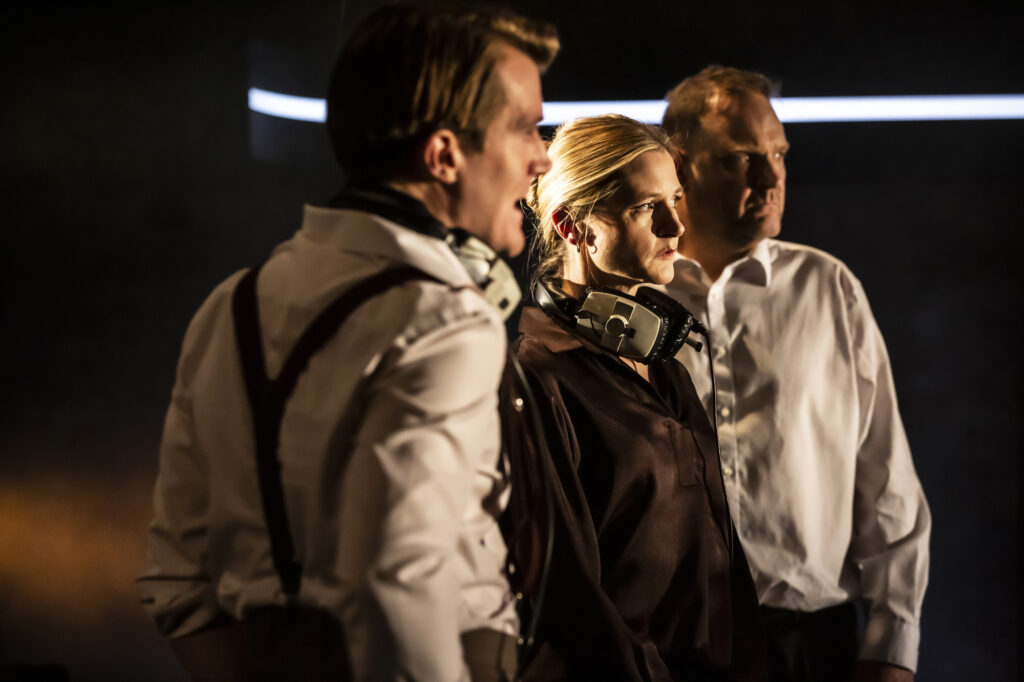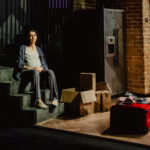
The Interview review – Original Theatre Online (Digital Release)
The digital production of Original Theatre’s The Interview, which premiered at The Park Theatre earlier this year, tells the story of Martin Bashir’s (Tibu Fortes) discredited 1995 Panorama with Princess Diana (Yolanda Kettle). Directed by Michael Fentiman, and with camera direction by Matt Hargraves, the digital production immediately uses the opportunities recording offers; it opens in colour with narrator Paul Burrell (Matthew Flynn) speaking in the present before fading to black and white as we are cast back to 1995, fading back to colour in the moments we return to the present. The tonal qualities of the black and white, with the sheer white of Emily Irish’s lighting and Paolo Bischi’s cinematography, match the film noir tone of Burrell’s introduction. Bashir emerges from the darkness behind Burrell, appearing as two ominous glowing eyes – the light glinting from his glasses.
Jonathan Maitland’s text projects Diana, not as a member of the royal family, but as a member of the royal household’s staff, and as a ‘People’s Princess’ who isn’t slightly interested in what the public thinks of her, only in her superiors opinion. She bemoans not having received any notes or letters from above congratulating her on a job well done. He includes very obvious throws forward to Harry and Meghan; Diana is considering an interview with Oprah Winfrey in America, even suggesting she might ‘ditch it all and live in America.’ When she raises Oprah with Bashir, he suggests, ‘It might piss people off…if you go American.’ Very much.
It feels like there is a comedy bursting to get out amongst this, but the lines are delivered too dryly. ‘Do they have a San Lorenzo in Karachi?’ asks Diana’s friend Luciana (Naomi Frederick) when Diana suggests she is considering moving to Pakistan with her heart surgeon partner, whom she treats to M&S ready-meals, and Bashir says things like, ‘So. Yea. I’m in a band.’ But there is little space for the humour in Fentiman’s serious direction. Maybe it existed in live performances, but it falters on the small screen recording.

Bashir woos Burrell on his way to attempting to woo Diana, though his Machiavellian approach for Burrell only requires a slight ego plump. For Diana it requires more than that, though he tries: ‘You’re the most incredible person I’ve ever met,’ he says, deadpan. He seeks to cast them as the same; two outsiders in the fields. When he tries to show her he’s done his homework, she shows him she is his match – though he wins in the end. His use of forged documents gets him there, confirming Diana’s suspicions and fears fraudulently – giving her what she wants, to get what he wants.
Kettle and Fortes do their best but they are hampered by Maitland’s dry, two-dimensional text. Like some of David Hare’s recent work, he spends more time preaching about the moral aspects of the story than attempting to draw us in. That is no more obvious than in the second half where the play attempts to unpick the journalistic practices Bashir uses, and questions what the role of the BBC is. One Corporation staff member questions whether they are reporting on the news or making it. Another talks about how they frame some of the interview’s quotes, cutting parts of the interview in an attempt to save Diana from herself. And it unsuccessfully attempts to draws parallels with fake news; voiceovers talk about rumours spread through Facebook and the characters talk about the lies we like (‘good lies’) and the lies we don’t, though it doesn’t quite land.
This moralising is stretched to breaking point as Bashir finds himself as the interviewee; BBC management questioning him about the interview with Diana. It reaches a point where Maitland is simply pontificating at us through these empty characters. It’s not that he doesn’t have a point – but it’s not very dramatic. ‘She wrote her own script,’ Bashir says of Diana, under this scrutiny: I wonder what she might make of Maitland’s script for her ghost. It appears in the play’s closing moments as a visitation on Bashir to take a potshot at her son, Prince William, and his public statement on the publication of the BBC’s report into the interview in 2021. Is there a moral question about giving the dead opinions on what has happened after they have passed? Shades of black and white.
The Interview is available to stream on Original Theatre Online















